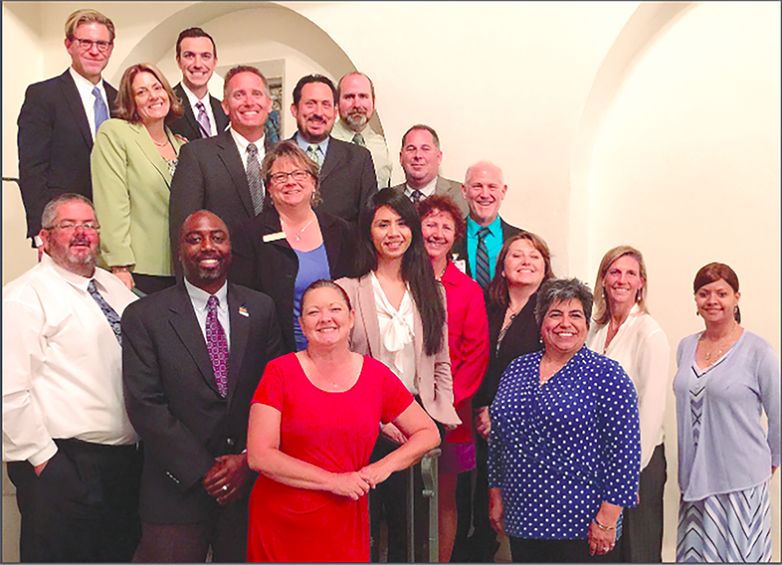
ACSA’s first-ever LGBTQ-focused event in May 2015 discussed empowering the voices of LGBT members and better support for LGBT students.
This is the last in a three-part series looking at ACSA’s impact on education over the last 50 years.
Part 1: A Driving Force for Education (Oct. 4)
Part 2: Developing and Supporting Leaders (Jan. 31)
Part 3: Advocating for Every Student (March 14)
It was one of the primary reasons for bringing seven different administrator organizations together in the first place: to speak with a unified voice. For 50 years, ACSA has given school leaders a way to amplify that voice with advocacy efforts that start at the grassroots level and reach lawmakers from the state Capitol to Washington, D.C. In recent years, ACSA has increasingly used that voice to ensure schools meet the diverse needs of their students with the goal of creating a more equitable education system in California.
A united voice for students
When a handful of school administrator associations funded a joint legislative office in Sacramento in the late 1960s, it was the catalyst for getting the leaders of those associations together to eventually form ACSA in 1971.
The major political issues during ACSA’s first decade were significant: Gov. Jerry Brown brought in collective bargaining and a voucher plan was proposed and defeated.
In ACSA’s early days, involvement in politics was seen as unprofessional, according to the late GR Director Jim Donnelly. “Times were different then. School administrators felt uncomfortable about getting involved with politics,” he was quoted in an EdCal special issue marking ACSA’s 25th anniversary.
That all changed with Proposition 13, the 1978 initiative that rewrote property tax laws and reduced revenues to schools. California’s per-pupil investment slipped from being among the best in the nation to among the worst, and school leaders realized they needed to get more involved in protecting school funding.
ACSA has had a legislative committee since its beginning. But back in the early 1990s, ACSA did not have a state board officer to lead advocacy work.
“If we were really going to enter into advocacy, we needed to make that an important position. It needed to be a board position, not just a committee chair,” said Sandy Clifton, who was on ACSA’s Legislative Action Committee at the time. “CTA was becoming a heavy lobbying firm. We had lobbyists and federal lobbyists, but we weren’t doing much to get members active.”
So in 1993-94, ACSA elected its first state Vice President for Legislative Action, Robert Kladifko. Each region also established a Vice President for Legislative Action, who became a voting member in the Delegate Assembly. The VPLAs, with leadership from the state VPLA, took on a front-facing role working with Government Relations staff to directly lobby their local legislators on behalf of ACSA’s legislative priorities.
Clifton ran for VPLA and won, starting her two-year term in 1995-96.
“We felt we needed to make it two years because you just got in and you’re learning the ropes. By February or March, you’re starting to get it all together, and then it’s over,” said Clifton, who went on to serve as ACSA President in 1999-00.
ACSA has given its members a vehicle for accessing state and national lawmakers to advocate for students’ needs. Members have walked the halls of Congress on federal lobbying trips to Washington, D.C. Thousands of ACSA members have told their stories to their representatives during the annual Legislative Action Day in Sacramento.
Building stronger relationships with elected officials at events like Legislative Action Day has given leaders insight into the realities of K-12 education. Clifton recalls inviting her local legislators to visit her school to see what a day in the life of a principal was like.
“Everything that could go wrong in a school day went wrong,” she said, remembering having to excuse herself from the tour to deal with a CPS matter. “They really got to see, you don’t just sit in your office. They got a little picture of what our job was.
“I think it’s made a big difference. With superintendents, I see they all seem to connect with their legislators now,” Clifton said. “They see it’s helpful to be on the forefront with them. … So that’s really powerful.”
ACSA’s voice has been heard by various state committees, boards and commissions. School leaders have served as a resource to policy makers in the governor’s office, Legislature, and the State Board of Education.
ACSA also created a Legal Alliance in order to raise funds to support litigation that impacts districts and administrators statewide. Through the Legal Alliance, ACSA filed a number of amicus briefs to support school leaders.
With guidance from ACSA’s Legislative Policy Committee, ACSA’s advocates have led countless efforts to reduce and eliminate negative provisions of legislative proposals, including negotiating to keep some from ever being introduced.
ACSA’s Advocacy Political Action Committee has supported the passage of statewide school facilities bonds, opposed vouchers, pushed for an increase in school funding, and contributed to student leadership development.
Advancing toward equity
In the early 2000s, schools gained access to student performance data that could be disaggregated by race and socio-economic status, it became apparent that California schools were not successfully serving all of their students, said Don Iglesias, ACSA president from 2001-02.
“It was the beginning of the era of accountability and there were state incentives and sanctions for schools and districts that did not show progress in narrowing the opportunity gap,” he said. “I believe that this was a tremendous step forward for education in California and forced us all to have earnest conversations with our staff, students, parents and school boards about how we could improve learning for all. It was the civil rights challenge of our era and continues on in current times.”
ACSA has been attuned to the need for equal opportunities for all students since its inception. ACSA has had an Equal Educational Opportunity committee dating back to 1972-73 that was charged with promoting “equal opportunity for educational economic and social advancement regardless of race, culture, religion, sex or handicapping conditions.”
But it wasn’t until 2014 that ACSA hired its first Equity Executive, Nicole Anderson, who served on ACSA’s equity committee at the time.
Anderson distinctly remembers what led to her taking the staff position at ACSA. She was presenting the equity report during an ACSA Region 4 retreat, which was attended by newly hired ACSA Executive Director Wes Smith.
“We had five minutes on the agenda, at the end, which was very common. I was pretty vocal about it and I was frustrated. I said this work is too important for it to get five minutes!” Anderson recalls. “Wes was there, and afterward he introduced himself, and at some point he said, ‘Why don’t you come to ACSA and help us do that work?’ I have to give him all the credit and vision for that position — he created it.”
So Anderson left Vallejo USD to start building capacity in school leaders throughout the state to advance equity in their schools.
Back in 2014, it was extremely rare for districts to have equity director positions, she said. Besides ACSA’s equity committee, the association had no existing programs or structures to support equity work. Anderson said she met resistance at times — why offer PD on equity if it’s not a priority for school districts? She said she focused on building relationships and traveled to ACSA regions to explain the need for equity action in schools.
“It’s not necessarily people didn’t want to do the work. It was more of they didn’t understand it. They didn’t know what it was,” she said. “They needed time to process it and have a safe space to hear it and not be blamed or shamed.”
Because there were few school administrators with equity expertise, Anderson brought in outside consultants to teach at Equity Institutes, where ACSA facilitated experts to come into specific districts that wanted to begin developing their equity plans. Some of the early districts involved were Victor Valley Union HSD, Rialto USD and Moreno Valley USD.
She collaborated with Academies Executive Mary Gomes to develop the Equity Administrators Academy, which still exists to this day. Anderson credits the work of ACSA staffers including Gomes and Events and Operations Director Danelle Buckley for helping to evolve ACSA’s work to include equity.
While at the time she wished more was accomplished, Anderson now sees her time at ACSA as a necessary first step when doing equity work.
“When I look back, I think the purpose of my position was not to bring a bunch of programs. It wasn’t one thing. It was to create the conditions for change,” she said. “And now I see the fruits.”
Today, ACSA infuses equity into everything it does, from having strands at every conference to presentations at each Leadership Assembly. Equity was added to ACSA’s new mission statement in 2017.
ACSA has worked alongside several partner organizations during that journey. ACSA helped establish the California Equity Leaders Alliance (CELA) – a coalition of statewide associations collaborating on equity-focused issues. The group included CSBA, Ed Trust West, PTA, CASBO and CCSESSA, CAAASA and CALSA.
ACSA also created affinity groups for African American, LGBTQ, Latinx, and Asian American and Pacific Islander administrators, providing networking activities, workshops on racial healing and allyship for these leaders.
In 2019, ACSA’s Equity Director Marguerite Williams created Sisterhood, a conference specifically focused on women of color in leadership. Other professional development events have included cultural proficiency courses and the recently launched Dare to Lead series to support women. ACSA will also host its first conference on supporting LGBTQ+ students, Lead With Pride Summit, in April 2022.
Following the 2020 murder of George Floyd and the racial reckoning that followed, ACSA was driving discussions on antiracist policy changes through its Antiracist Taskforce collaborating with CSBA.
“Ten years ago, ACSA would never have had conversations about race, racism or whiteness. This was not who we were as an organization,” said current Senior Director of Equity Services Adonai Mack. “So we have seen significant growth in the past decade.”
VPLA Sandy Clifton presents a Committee Leadership Award to Robert Kladifko, ACSA’s first VPLA, in 1996.
Nancy Spaeth, Joann Merrick and Cheryl Ernst share their perspectives with the Commission for the Establishment of Academic Content and Performance Standards in 1997.
ACSA Equity Executive Nicole Anderson leads an LBGT panel in 2017.
ACSA Board pictured with Gov. Jerry Brown.
ACSA members pose with Speaker of the U.S. House of Representatives Nancy Pelosi in 2019.
ACSA members participate in the 2019 Legislative Action Day, the last time it was held in person.
ACSA members participate in the 2019 Legislative Action Day, the last time it was held in person.
ACSA at 50
Keep watching for ACSA at 50 features in EdCal each week and find out how you can help celebrate at acsa.org/acsa50.
Contact Us
www.acsa.org
© 2022 Association of California School Administrators








